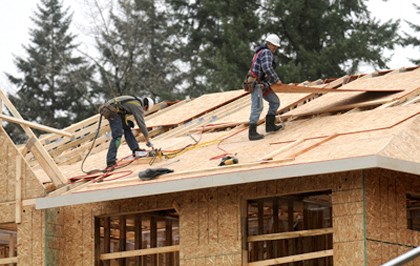Coquitlam Mayor Richard Stewart is pushing back against the provincial government’s assertions that municipal fees and development cost charges (DCCs) are a contributing factor to sky-high real estate prices in Metro Vancouver.
Tuesday’s throne speech pledged the province will “work with municipalities to reduce the hidden cost in home purchases, and to make those hidden costs clear and transparent to the home buyer.”
That’s expected to translate into a requirement that home buyers receive a breakdown of how various fees and levies imposed by local governments on developers add to the cost of a new unit.
But Premier Christy Clark said she won’t force cities to reduce their fees, which help fund everything from water and sewer lines to parks and social housing.
“We don’t intend to interfere with that,” Clark told reporters. “I think local governments are just as concerned about this as I am. So hopefully they’ll address their end of it.”
But on Wednesday Stewart called the issue a red herring, noting that economists have found cities’ fees have almost no effect on the market price of housing.
“Local governments have very few tools to finance the costs associated with new development,” he said. “Our goal has to be to ensure that the new development pays its own way, and that those costs aren’t thrown on the back of existing homeowners.”
The provincial government regulations set DCCs, which Stewart said are used to connect new commercial and housing project to the grid and ensure that there are service to support the additional population increases.
Reducing DCCs, he said, would only mean that the developer would pocket more money while existing taxpayers would foot the bill for new infrastructure and services associated with new projects.
The high price of housing is a function of demand, Stewart said, noting that increasing the residential stock is the only way economists believe will real estate costs can be reduced.
“We are all facing enormous pressure to try to allow the supply to meet demand,” he said. “We are going to need the basic amenities in our communities to support that as well. That can’t be funded on the backs of existing residents.”
Vancouver Mayor Gregor Robertson echoed some of the Stewart’s statement.
He said development cost charges reflect the city and staff costs of dealing with a development while community amenity charges are invested in new facilities so neighbourhoods keep pace with growth.
“If we’re going to do a whole bunch of growth and not collect that money, then we don’t have money to invest in community centres and parks and that,” Robertson warned.
But Greater Vancouver Home Builders Association CEO Bob de Wit said additional municipal levies and fees can make a difference for home buyers. A 2014 study commissioned by the association found municipal fees and charges added $17,124, or 4%, to the cost of a typical townhouse in Metro Vancouver.
But that can vary wildly. For instance, the study found fees in Surrey added 10% ($33,700) to the cost of each unit in one sample development. De Wit said the total additional costs from fees and taxes likely climbs to around 23% once provincial and federal taxes are added.
“If we can reduce that 23% from all government fees to 15 or 18%, that’s a huge chunk of money for most people and it could be the difference between not being able to buy at all or buying a house instead of a townhouse or a townhouse instead of a condo,” de Wit said.
While rising land values are the dominant factor in soaring prices for Vancouver houses, de Wit said fees “matter a lot” for first-time buyers seeking more affordable entry-level homes, particularly in outlying suburbs.
De Wit noted cities are inconsistent in how high the fees are and what they go towards.
“In Vancouver, the emphasis is on social housing. In Surrey, it’s more on parks,” he said.
Community amenity fees are negotiated in some areas and fixed in others, he added.
“They’re all calculated differently,” he said. “What we like as an industry is predictability.”
Robertson said the only government interventions that make sense to him are luxury or speculation taxes to target the “very high profits that are being harvested from a market that’s growing very fast and punishing people on low and middle incomes who can’t afford to stay.”
The province has signalled it may adjust the property transfer tax to charge more when high-value homes change hands.
The B.C. Liberals have long argued that cities could help the housing affordability crisis on the supply side by giving the green light to denser neighbourhoods and the construction of more units.
@gmckennaTC



